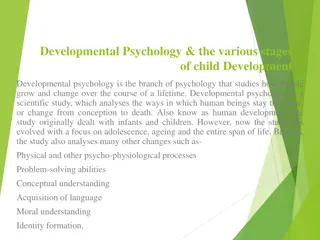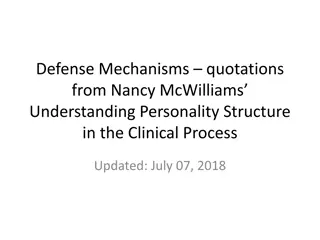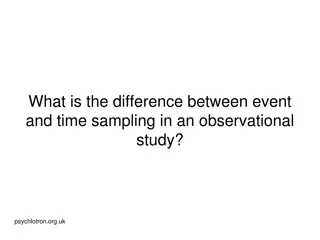Defense Mechanisms in Psychology
Defense mechanisms are psychological strategies used unconsciously to protect individuals from anxiety and unpleasant feelings. Understanding different types of defense mechanisms, such as denial, can provide insights into how individuals cope with stress and maintain emotional well-being. By recognizing and addressing these mechanisms, individuals can develop healthier ways of managing emotions and relationships.
Download Presentation

Please find below an Image/Link to download the presentation.
The content on the website is provided AS IS for your information and personal use only. It may not be sold, licensed, or shared on other websites without obtaining consent from the author.If you encounter any issues during the download, it is possible that the publisher has removed the file from their server.
You are allowed to download the files provided on this website for personal or commercial use, subject to the condition that they are used lawfully. All files are the property of their respective owners.
The content on the website is provided AS IS for your information and personal use only. It may not be sold, licensed, or shared on other websites without obtaining consent from the author.
E N D
Presentation Transcript
B.A. PART I (H) 12TH MAY 2020 KUMARI RANJEETA GUEST FACULTY M. L. ARYA COLLEGE, DEPTT. OF PSYCHOLOGY E-mail- bkranjeeta@gmail.com Mb. No.- 8969020842
12 MAY 2020 B.A. PART I (H) PAPER III, UNIT II (STRESS PROBLEM OF ADJUSTMENT) EGO DEFENCE MECHANISM I Sigmund Freud (1894, 1896) noted a number of ego defenses which he refers to throughout his written works. Defense mechanism are psychological strategies that are unconsciously used to protect a person from anxiety arising from unacceptable thoughts or feelings. His daughter Anna (1936) developed these ideas and elaborated on them, adding ten of her own. Many psychoanalysts have also added further types of ego defenses.
12 MAY 2020 B.A. PART I (H) PAPER III, UNIT II (STRESS PROBLEM OF ADJUSTMENT) Defense mechanisms is to protect from feelings of anxiety or guilt, which arise because we feel threatened, or because our id or superego becomes too demanding. Defense mechanisms operate at an unconscious level and help ward off unpleasant feelings (i.e., anxiety) or make good things feel better for the individual. Ego-defense mechanisms are natural and normal. When they get out of proportion (i.e., used with frequency), neuroses develop, such as anxiety states, phobias, obsessions, or hysteria.
12 MAY 2020 B.A. PART I (H) PAPER III, UNIT II (STRESS PROBLEM OF ADJUSTMENT) In some areas of psychology (especially in psychodynamic theory), psychologists talk about defense mechanisms, or manners in which a person behaves or thinks in certain ways to better protect or defend their inner selves (their personality and self-image). Defense mechanisms are one way of looking at how people distance themselves from a full awareness of unpleasant thoughts, feelings, and behaviors. Psychologists have categorized defense mechanisms based upon how primitive they are. The more primitive a defense mechanism, the less effective it works for a person over the long-term.
12 MAY 2020 B.A. PART I (H) PAPER III, UNIT II (STRESS PROBLEM OF ADJUSTMENT) However, more primitive defense mechanisms are usually very effective short-term, and hence are favored by many people and children especially (when such primitive defense mechanisms are first learned). Adults who don t learn better ways of coping with stress or traumatic events in their lives will often resort to such primitive defense mechanisms as well. Most defense mechanisms are fairly unconscious that means most of us don t realize we re using them in the moment. Some types of psychotherapycan help a person become aware of what defense mechanisms they are using, how effective they are, and how to use less primitive and more effective mechanisms in the future.
12 MAY 2020 B.A. PART I (H) PAPER III, UNIT II (STRESS PROBLEM OF ADJUSTMENT) Primitive Defense Mechanisms 1. Denial Denial is the refusal to accept reality or fact, acting as if a painful event, thought or feeling did not exist. It is considered one of the most primitive of the defense mechanisms because it is characteristic of early childhood development. Many people use denial in their everyday lives to avoid dealing with painful feelings or areas of their life they don t wish to admit. For instance, a person who is a functioning alcoholic will often simply deny they have a drinking problem, pointing to how well they function in their job and relationships.
12 MAY 2020 B.A. PART I (H) PAPER III, UNIT II (STRESS PROBLEM OF ADJUSTMENT) 2. Regression Regression is the reversion to an earlier stage of development in the face of unacceptable thoughts or impulses. For an example an adolescent who is overwhelmed with fear, anger and growing sexual impulses might become clingy and start exhibiting earlier childhood behaviors he has long since overcome, such as bedwetting. An adult may regress when under a great deal of stress, refusing to leave their bed and engage in normal, everyday activities. 3. Acting Out Acting Out is performing an extreme behavior in order to express thoughts or feelings the person feels incapable of otherwise expressing. Instead of saying, I m angry with you, a person who acts out may instead throw a book at the person, or punch a hole through a wall.
12 MAY 2020 B.A. PART I (H) PAPER III, UNIT II (STRESS PROBLEM OF ADJUSTMENT) When a person acts out, it can act as a pressure release, and often helps the individual feel calmer and peaceful once again. For instance, a child s temper tantrum is a form of acting out when he or she doesn t get his or her way with a parent. Self-injury may also be a form of acting-out, expressing in physical pain what one cannot stand to feel emotionally. 4. Dissociation Dissociation is when a person loses track of time and/or person, and instead finds another representation of their self in order to continue in the moment. A person who dissociates often loses track of time or themselves and their usual thought processes and memories. People who have a history of any kind of childhood abuse often suffer from some form of dissociation.
12 MAY 2020 B.A. PART I (H) PAPER III, UNIT II (STRESS PROBLEM OF ADJUSTMENT) 5. Compartmentalization Compartmentalization is a lesser form of dissociation, wherein parts of oneself are separated from awareness of other parts and behaving as if one had separate sets of values. An example might be an honest person who cheats on their income tax return but is otherwise trustworthy in his financial dealings. In this way, he keeps the two value systems distinct and sees no hypocrisy in doing so, perhaps remaining unconscious of the discrepancy. 6. Projection Projection is when you put your feelings or thoughts onto another person, as though they were that person s feelings and thoughts. Projection is the misattribution of a person s undesired thoughts, feelings, or impulses onto another person who does not have those thoughts, feelings or impulses.
12 MAY 2020 B.A. PART I (H) PAPER III, UNIT II (STRESS PROBLEM OF ADJUSTMENT) 7. Reaction Formation Reaction Formation is the converting of unwanted or dangerous thoughts, feelings or impulses into their opposites. For instance, a woman who is very angry with her boss and would like to quit her job may instead be overly kind and generous toward her boss and express a desire to keep working there forever. She is incapable of expressing the negative emotions of anger and unhappiness with her job, and instead becomes overly kind to publicly demonstrate her lack of anger and unhappiness. Continue in next class .























